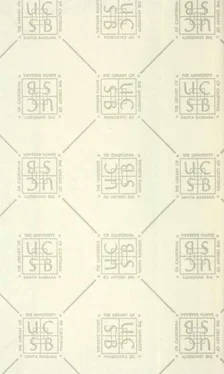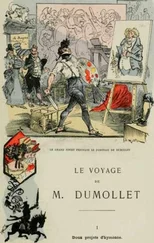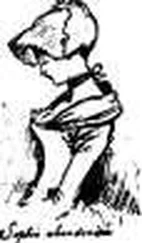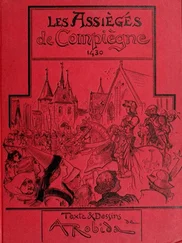Albert Robida - Yester-year; ten centuries of toilette from the French of A. Robida
Здесь есть возможность читать онлайн «Albert Robida - Yester-year; ten centuries of toilette from the French of A. Robida» весь текст электронной книги совершенно бесплатно (целиком полную версию без сокращений). В некоторых случаях можно слушать аудио, скачать через торрент в формате fb2 и присутствует краткое содержание. Жанр: Старинная литература, на английском языке. Описание произведения, (предисловие) а так же отзывы посетителей доступны на портале библиотеки ЛибКат.
- Название:Yester-year; ten centuries of toilette from the French of A. Robida
- Автор:
- Жанр:
- Год:неизвестен
- ISBN:нет данных
- Рейтинг книги:4 / 5. Голосов: 1
-
Избранное:Добавить в избранное
- Отзывы:
-
Ваша оценка:
- 80
- 1
- 2
- 3
- 4
- 5
Yester-year; ten centuries of toilette from the French of A. Robida: краткое содержание, описание и аннотация
Предлагаем к чтению аннотацию, описание, краткое содержание или предисловие (зависит от того, что написал сам автор книги «Yester-year; ten centuries of toilette from the French of A. Robida»). Если вы не нашли необходимую информацию о книге — напишите в комментариях, мы постараемся отыскать её.
Yester-year; ten centuries of toilette from the French of A. Robida — читать онлайн бесплатно полную книгу (весь текст) целиком
Ниже представлен текст книги, разбитый по страницам. Система сохранения места последней прочитанной страницы, позволяет с удобством читать онлайн бесплатно книгу «Yester-year; ten centuries of toilette from the French of A. Robida», без необходимости каждый раз заново искать на чём Вы остановились. Поставьте закладку, и сможете в любой момент перейти на страницу, на которой закончили чтение.
Интервал:
Закладка:
The frisky eigliteenth century, kept in check under the rod of the grumbling and impotent old seventeenth, which seemed endless, was about to behave itself all of a sudden like an emancipated page, and to toss its cap very high indeed over all possible windmills.
Fashion, said by moralists to be the daughter of frivolity, invented a thousand new follies to do honour to its mother, and as though that were not enough, it re-adopted some of the old ones which had been so long forgotten that they were once more charming.
Fashion in the eighteenth century, from the Regency period onward, was characterized by
breadth and amplitude, in fact by a return to the skirts of tlie time of Henri III,, the farthingale with its consequences, width of sleeves and height of head-dresses, and these were soon to be exaggerated in virtue of a law of
Oct
equilibrium and harmony.
Under Henri III., it was the ruff that grew up and forced the head into a portentous 'horn'; under Louis XV. and Louis XVI., it was the head-dress that became monumental.
The farthingale reappeared under the name of 'panier.' It came from the other side of the Channel. Two English ladies brought specimens to Paris, and exhibited them in the Garden of the Tuileries. The extravagant fullness of these ladies' skirts excited great surprise among the men and women who were taking their daily v/alk in the Gardens, a crowd gathered round the foreigners, and pressed on them so closely that they were in danger of being flattened, if not smothered. At length a gallant oflicer of the Mousquetaires du Roi interfered, and extricated the ladies and their paniers from a very unpleasant position.
At that time the fashions did not travel round the civilized world in six months, and disappear, without being entirely used up, in less than two seasons. They took time to come forth and be developed, and they lasted in their chief features, Avith the alterations, adjuncts, or improvements tliat were suggested every day, for several years.
The panier was destined to live throughout the century, and it took no less an event than the Revolution to kill it.
Some years elapsed before the farthingale completely reconquered Paris ; its restoration was effected slowly, timidly, by modest attempts, then, one fine day, about 1730, it won, and its undisputed reign began. All the ladies, discarding half measures and demi-paniers, adopted the large panier, six feet in diameter, which took at least ten ells of stuff to cover it.
'Panier' was the self-evident name for this extraordinary article of costume, for the first petticoat extension was contrived by means of osier or cane hoops, bird-cages in fact ; the whalebone arrangement came afterwards. A Master of Requests whose name wns
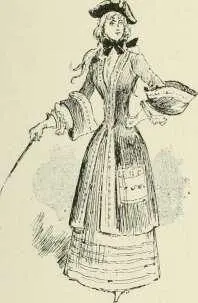
Regency liuuting-costume.
Pannier having perished in a shipwreck on his voyage home from the Antilles, his sad fate was used by cruel fashion as a pretext for giving a nickname to the panier, just then in the tiawii of its rcnowu. Prior to this were the ' little Janseiiist paniers,' coming down to the knee only ; the ' creaker ' (a bustle made of linen cloth, much gummed and folded), which creaked at the slightest movement ; the 'call-bird,' the 'finger it,' the 'wench,' and the ' tumble.' ^ All these names were inventions of a time that was by no means prudish ; there were also the more respectable small paniers called 'considerations.' For some time the large ones were called ' maîtres des requêtes.*
The large panier letl naturally to a change in the make of gowns. Then arose those most graceful, dexterously-negligent fashions which we have called by the name of Watteau, in honour of the great painter of gala gallantry, on whose canvas so many of the fair ladies of his time survive "in hoops of wondrous size," painted and patched, fan or tall cane in hand, and always ready to embark for Cyprus with some red-heeled admirer.
^ Criardo. Itonti^-on-tvnin, tàtez-y, gourgandine, culbute.
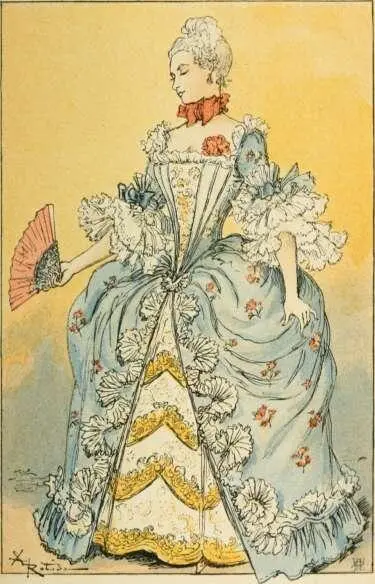
The real realm of Cytliera was, however, Paris, whether governed by the Regent or by
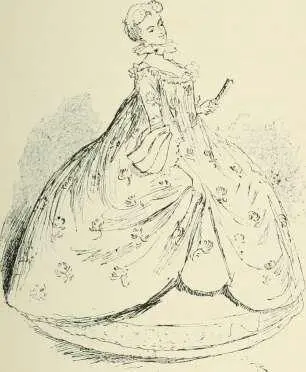
Flying Gowu.
Louis the Well-beloved. The century had fifty years before it, in which to gambol and amuse itself, fifty years for games and laughter, but the time Avould come when the powder and the patches were to be washed off by tears.
In this day of 'the unbraced cestus,' fashion invented loose gowns without either bodice or girdle, hanging straight from the slioulders over the wide-spread panier, or only fitted to the waist in front, and left quite loose with large folds at the back. This device gave the wearer an air of pretty carelessness and indolent OTace, the distino-uishinsr mark of the age.
The thick and heavy stuffs of the preceding l^eriod were unfit for these loose hanging gowns, and to drape the vastness of the paniers, so lighter fabrics were adopted, lawn, muslin, dimity, and other thin stuffs with bouquet patterns, or scattered flowers, or even little rural designs.
On fine days the promenades were crowded with ladies who looked as though they had come out in their morning costume, in gowns fashioned like dressing-gowns, their arms emerging from clouds of lace, and tlieir faces from soft frills, as they waved tlieir fans, and lazily clicked tlieir higli-lieeled slippers.
It was the period of the Regency ! There is a world of meaning in that word. The suppers and the orgies of the Palais-Royal were largely imitated elsewhere ; there was many a Parabère in the gay and pleasure-loving city, which had just then been thrown into fresh excitement by the fever of sjieculation. Day after day the believers in John Lav/ were either enriched or ruined ; some making fabulous fortunes that enabled them to procure every kind and every degree of enjoyment, others being beggared, so that they had to drown their sorrows in dissipation at any cost.
The satirists of the pen had plenty of material in the loose gowns, the paniers, the head-dresses, the gew-gaws, all the daily inventions of fashion. Plays and songs, the Italian theatre, and the booth in the fair, caricatures and pamphlets, ridiculed the preposterous paniers, while the triumphant paniers mocked the mockers, and swelled themselves out more and more vaingloriously.
Everybody laughed or lamented. Here were several ladies to be accommodated in a coach which could only hold one with her balloon-skirt ? Everything was too small ; the streets were too narrow ; salon-doors had to be widened to allow the overgrown ladies to pass in, just as it became necessary afterwards to make the doors higher at the top, so that the gigantic head-dresses of later days might enter without a hitch.
The arm-chairs were not big enough ; how Was a lady to sit down with those tremendous hoops, which either refused to be squeezed into the seat, or started up in the most embarrassing way ?
Nevertheless, paniers went on growing larger until the early] days of Marie Antoinette, and the skirts worn over them were laden more and more heavily with big and little flounces, lattice work, pleated frills, scallops, or ribbons arranged in a thousand different ways. These fashions were in some cases as pretty as
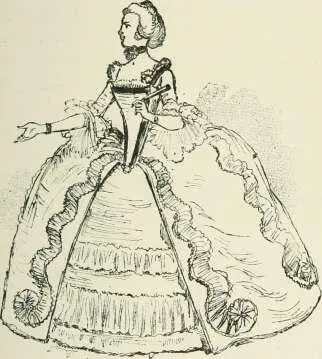
Large P.iuier.
they were comphcated, but in otliers they were merely absurd.
Читать дальшеИнтервал:
Закладка:
Похожие книги на «Yester-year; ten centuries of toilette from the French of A. Robida»
Представляем Вашему вниманию похожие книги на «Yester-year; ten centuries of toilette from the French of A. Robida» списком для выбора. Мы отобрали схожую по названию и смыслу литературу в надежде предоставить читателям больше вариантов отыскать новые, интересные, ещё непрочитанные произведения.
Обсуждение, отзывы о книге «Yester-year; ten centuries of toilette from the French of A. Robida» и просто собственные мнения читателей. Оставьте ваши комментарии, напишите, что Вы думаете о произведении, его смысле или главных героях. Укажите что конкретно понравилось, а что нет, и почему Вы так считаете.
